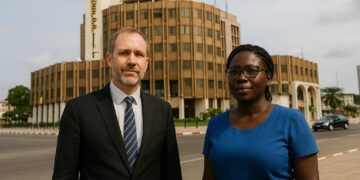Brazzaville conference spotlights AI in finance
Brazzaville’s Hilton Towers became a buzzing ideas lab on 21 October 2025 as policymakers, bankers and researchers debated how artificial intelligence could reshape Africa’s financial systems.
The high-level conference, staged by the Ministry of Posts, Telecommunications and the Digital Economy with UNECA, Acadys, BFTI and the African Centre for AI Research, promised to convert technology rhetoric into investable action.
High-level partnerships and goals
Minister Léon-Juste Ibombo insisted that AI is already “a tangible reality, omnipresent in daily life and public affairs,” and said Congo intends to anchor national sovereignty on its effective deployment.
Almost two hundred delegates, spanning regulators, commercial banks, micro-lenders, start-ups and university labs, gathered to showcase prototypes or scout partnerships.
Their presence signalled that Brazzaville seeks collective intelligence, not isolated pilots, in its digital transition.
From ambition to sovereign strategy
UNECA Sub-Regional Office head Jean-Luc Mastaki Namegabé hailed Congo’s “commitment to position AI as a strategic lever for economic modernisation,” pledging technical advice and wider policy networks.
Acadys president Dr Christophe Legrenzi urged the room to imagine African finance “powered by AI and fuelling robust, inclusive growth” across the continent.
Infrastructure, skills and trust hurdles
Speakers nevertheless listed infrastructure, skills and governance gaps that must be closed before machine learning can scale responsibly.
Congo’s fibre backbone now links key urban corridors, yet rural connectivity remains patchy, limiting the data lakes essential for advanced analytics.
Banking executives noted that legacy core systems still dominate back-office operations, constraining tests with real-time credit scoring or behavioural risk models.
Ibombo therefore called for “modern digital infrastructure, specialised training and an ethical data framework that protects citizens while attracting investment.”
Use cases transforming African banking
Panelists pointed to live African use cases, from automated onboarding to predictive fraud detection and hyper-personalised mobile wallets.
Local fintech data scientists demonstrated sandboxes where algorithms flag suspicious payments before losses occur, a capability banks welcomed as compliance costs climb.
Regulators familiar with CEMAC guidelines argued that algorithmic decisions must stay transparent and auditable to prevent discrimination and maintain trust.
Regulation and ethical guardrails
Delegates urged Congo to engage actively in global AI standard-setting so that African values inform emerging rules.
Mastaki Namegabé stressed that early input from Brazzaville can shape training-data governance, privacy safeguards and accountability regimes aligned with regional realities.
Economic dividends on the horizon
Finance-ministry analysts projected budgetary dividends, citing streamlined revenue administration, tighter expenditure controls and predictive tools to guide counter-cyclical policy.
They cautioned, however, that algorithms demand reliable macroeconomic data, underscoring the need to bolster statistical capacity.
Economists from the University of Marien-Ngouabi shared models suggesting broad AI adoption could lift financial-sector productivity by seven percent within five years, if digital-identity and credit-bureau reforms advance together.
Regional venture-capital funds voiced interest in seed-stage analytics companies but emphasised predictable tax rules and swift licensing to keep deal pipelines fluid.
Building the talent pipeline
Students from the Higher Institute of Technology recounted juggling coursework with online machine-learning bootcamps, illustrating a self-organised yet fragile talent pipeline.
Cybersecurity and resilience
Cyber-risk consultants reminded delegates that expanded attack surfaces accompany digital acceleration, urging proactive penetration testing and regional cooperation against cross-border payment fraud.
They pointed to recent malware incidents in neighbouring markets as evidence that resilience investments must advance in tandem with AI innovation.
Financing the transformation
Development-finance representatives discussed blended-finance structures combining concessional loans, private equity and technical assistance to de-risk early AI pilots in public finance management.
Examples included matching grants for cloud-native core banking migrations and outcome-based contracts rewarding verified reductions in manual processing times.
Inclusion and sustainability lenses
Civil-society advocates pressed for gender-responsive AI design, warning that biased datasets could unintentionally exclude women-led microenterprises from automated credit scoring models.
UNECA responded that its forthcoming Responsible AI framework will feature inclusion metrics, offering Congo a template to localise.
Energy experts observed that data-centre electricity demand is rising, suggesting green-power purchase agreements could mitigate carbon intensity while lowering long-term operating costs.
Ibombo acknowledged the link between digital expansion and climate goals, noting Congo’s hydro potential as an asset for sustainable cloud services.
Governance and accountability roadmap
The forthcoming task force, officials explained, will comprise representatives from finance, telecoms, higher education, the private sector and civil society, reporting directly to the Prime Minister’s office.
Quarterly dashboards will track indicators such as digital-payment penetration, AI-driven loan disbursements and cyber incident response times.
Stakeholders expect the first progress report to be unveiled at Congo’s Digital Week forum next July.
Next steps for Congo’s AI roadmap
Afternoon reflections shifted back to momentum, as Dr Legrenzi called for follow-up workshops and stronger media outreach to broaden engagement.
Observers departed convinced that Congo’s AI agenda has moved from aspiration to implementation, though success will rest on sustained collaboration between state, industry and academia.
Ibombo closed proceedings by announcing a forthcoming national AI strategy aligned with the Digital Economy 2025 plan and open to multilateral financing.
He added that a dedicated task force will publish an action roadmap early next year, detailing pilot projects, funding envelopes and metrics to track socioeconomic impact.












































